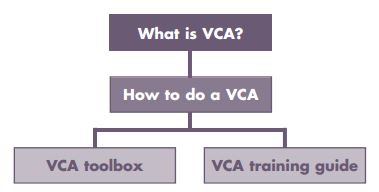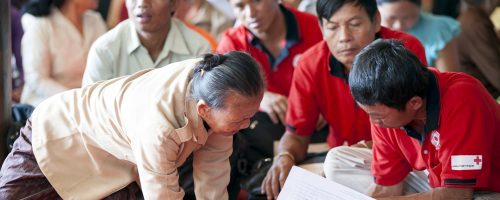Vulnerability and capacity assessment (VCA) is a process of participatory investigation designed to assess and address major risks affecting communities. It aims to determine people’s vulnerability to those risks, and their capacity to cope and recover from a disaster.
VCA makes it possible for National Societies to work with vulnerable communities to:
- Help them understand the hazards they face;
- Assist them in taking the necessary measures to improve the situation, based on their own skills, knowledge and initiatives.
Guiding documents
- Gender and diversity sensitive vulnerability and capacity assessment (VCA)
- What is VCA? An introduction to vulnerability and capacity assessment
- How to do a VCA? A practical step-by-step guide for Red Cross and Red Crescent staff and volunteers
- VCA toolbox with reference sheets
- VCA training guide
- VCA lessons learnt and recommendations
- A practical step by step VCA guide for Red Cross and Red Crescent field practitioners and volunteers
- Integrating climate change and urban risks into the VCA
- How can climate change be considered in VCA?
Guiding documents from National Societies
- Participatory Evaluation of the Vulnerability and Capacity Assessments (VCA) and Comparative Analysis with the Community Based Disaster Risk Assessment (CBDRA)
- Audiovisual/video: Gender and Diversity Sensitive Vulnerability and Capacity Assessment (VCA)
- Vulnerability and Capacity Assessment (VCA): Manual for Viet Nam Red Cross Practitioners
- Hazard, Vulnerability and Capacity Assessment (VCA) by Cambodian Red Cross
- Vulnerability & Capacity Assessment (VCA) powerpoint presentation by Thai Red Cross [Thai language]
- Facilitator’s Guide on VCA Training Pelatihan VCA dan Participatory Rural Appraisal (PRA) [Indonesian Language]
- Gender and diversity-sensitive approach to VCA tools
See also the VCA in practice at this weblink: Working together with Thai communities on disaster resilience with a strong focus on gender and diversity
There are no upcoming events.
e-mail: Disaster Risk Management Delegate, Hung Ha Nguyen, at hungha.nguyen@ifrc.org
IFRC VCA publications are structured as below:

Each document serves a specific purpose:
- What is VCA? – The first publication is an introduction to VCA aimed at National Society and Federation delegation staff, donors and partners.
- How to do a VCA – The second publication is a step-by-step guide to undertaking a VCA for National Society staff and volunteers.
- VCA toolbox – The third publication is a description of research methods and instruction in how to use a variety of information-gathering techniques.
- VCA training guide – The fourth publication is a hands-on, learning-by-doing training manual.
![]()


